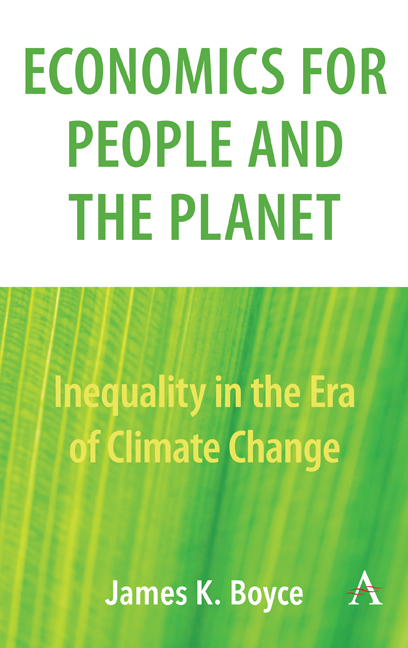Book contents
- Frontmatter
- Contents
- List of Illustrations
- Acknowledgements
- Part I Rethinking Economics and the Environment
- Part II Environmental Injustice
- Chapter 9 Inequality and the Environment
- Chapter 10 Clean Air for All
- Chapter 11 Letter from Flint
- Chapter 12 Let Them Drink Pollution?
- Chapter 13 Letter from Delhi
- Chapter 14 Mapping the Environmental Riskscape
- Chapter 15 Measuring Pollution Inequality
- Chapter 16 Cleaning the Air and Cooling the Planet
- Part III Climate Policy
- Notes
- Publication History
- Index
Chapter 14 - Mapping the Environmental Riskscape
from Part II - Environmental Injustice
Published online by Cambridge University Press: 12 February 2019
- Frontmatter
- Contents
- List of Illustrations
- Acknowledgements
- Part I Rethinking Economics and the Environment
- Part II Environmental Injustice
- Chapter 9 Inequality and the Environment
- Chapter 10 Clean Air for All
- Chapter 11 Letter from Flint
- Chapter 12 Let Them Drink Pollution?
- Chapter 13 Letter from Delhi
- Chapter 14 Mapping the Environmental Riskscape
- Chapter 15 Measuring Pollution Inequality
- Chapter 16 Cleaning the Air and Cooling the Planet
- Part III Climate Policy
- Notes
- Publication History
- Index
Summary
African Americans, Latinos and low-income communities bear outsized pollution burdens in the United States.
America's corporate polluters are not colour-blind. Nor are they oblivious to distinctions of class. Studies of environmental inequality have shown that minorities and low-income communities often bear disproportionate pollution burdens. In other words, rather than being an impersonal ‘externality’ randomly distributed across the population, the distribution of pollution mirrors the distribution of power and wealth.
These disparities result from decisions by firms to site hazardous facilities in the most vulnerable communities and from decisions by government regulators to put lower priority on environmental enforcement in these communities. To some extent, they also may reflect demographic changes as pollution leads affluent people to move out, neighbourhood property values to fall and poorer households to move in. Even after controlling for income differences, however, racial and ethnic minorities typically face higher pollution burdens, a finding that implies that disparities are a result of differences in political power as well as purchasing power.
But the United States is a big country, and it is not homogeneous. Electoral politics, social movements, industrial structure, residential segregation and even laws and regulations differ greatly across the regions. The extent and pattern of environmental inequalities may vary, too.
In a recent study, we examined regional variations to tackle two key questions. First, is minority status or income more important in explaining environmental disparities? Second, is higher income equally protective for whites and minorities in affecting pollution exposure?
In our study we used the US Environmental Protection Agency (EPA) database called Risk-Screening Environmental Indicators (RSEI). These data can be traced to the demands of environmental advocates for disclosure of information on the hazards faced by communities in the wake of the tragic 1984 accident at a chemical plant owned by a US company in Bhopal, India, in which thousands of nearby residents died and many more were severely injured. In response to this man-made disaster, the US Congress passed the Emergency Planning and Community Right-to-Know Act, which requires companies to report their releases of dangerous chemicals into our air, water and lands. The EPA makes this information available to the public in its annual Toxics Release Inventory. The RSEI database uses this information to estimate industrial pollution exposures in neighbourhoods throughout the country.
- Type
- Chapter
- Information
- Economics for People and the PlanetInequality in the Era of Climate Change, pp. 65 - 68Publisher: Anthem PressPrint publication year: 2019



